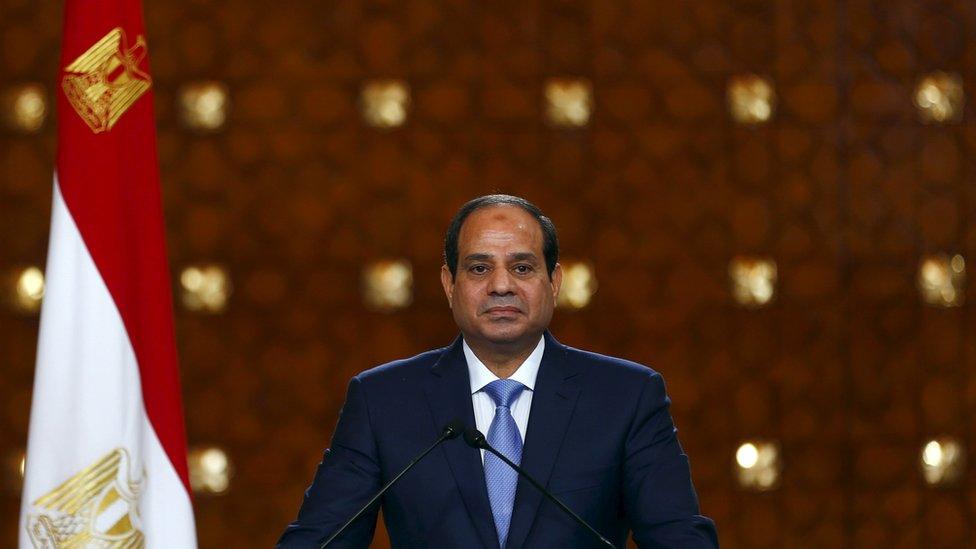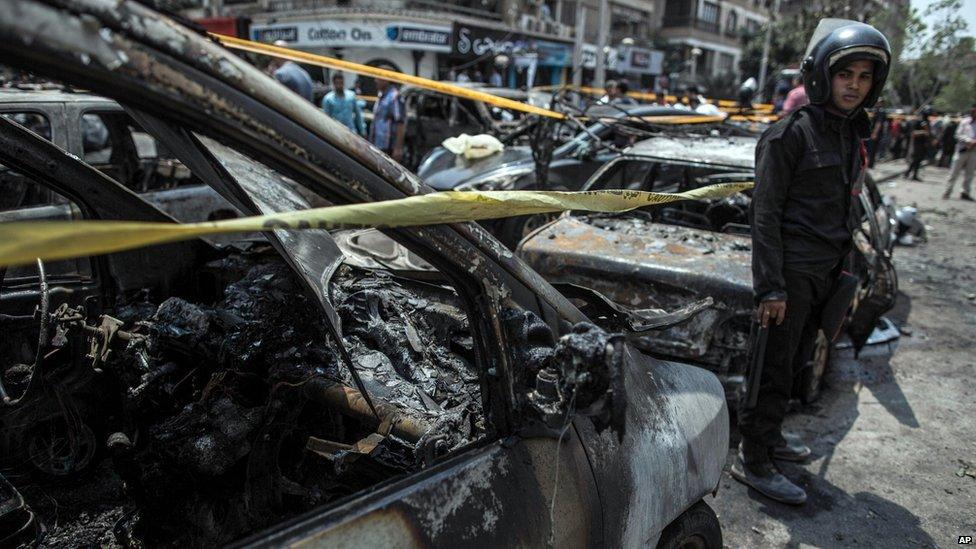Egypt's al-Sisi imposes strict anti-terrorism laws
- Published
- comments

Abdul Fattah al-Sisi vowed in June to introduce tougher anti-terror laws
Egyptian President Abdul Fattah al-Sisi has approved stringent new counter-terrorism laws to fight a growing jihadist insurgency.
The laws establish special courts and offer additional protection from legal consequences for military and police officers who have used force.
They also impose the death penalty for anyone found guilty of setting up or leading a terrorist group.
Rights groups say the legislation will be used by Mr Sisi to crush dissent.
Jihadist groups stepped up their attacks after the military overthrew President Mohammed Morsi two years ago and launched a deadly crackdown on the Muslim Brotherhood.
President Sisi vowed to bring in tough new counter-terrorism legislation in June, following the assassination by car bomb of Prosecutor General Hisham Barakat.
Under the new laws introduced on Monday:
trials for suspected militants will be fast-tracked through special courts. Anyone found guilty of joining a militant group could face 10 years in prison
financing terrorist groups will also carry a penalty of life in prison (25 years)
inciting violence or creating websites deemed to spread terrorist messages will carry sentences of five to seven years
journalists can be fined between 200,000 and 500,000 Egyptian pounds (£16,300-£41,000; $25,550-$64,000) for contradicting official accounts of militant attacks. The original draft of the law was amended following domestic and international outcry after it initially called for a two-year prison sentence
Last week, Amnesty International warned, external that the legislation would vastly expand powers that would usually only be invoked during a state of emergency, and that it would effectively ban the rights to freedom of expression, peaceful assembly and association.

Social media reaction: BBC Monitoring
Many Egyptians reacted negatively on social media to the new anti-terrorism law approved by President Abdul Fattah al-Sisi. Many users said its measures were too harsh or excessive.
Human rights activist Jamal Eid tweeted: "Midnight laws mark the republic of darkness. A law which has been passed, and considers all criticism or dissenting voice or acts that are not to the state's liking... terrorism."
His sentiments were echoed by the editor-in-chief of pro-Islamist newspaper Al-Misriyun, Mahmoud Sultan, who wrote: "The anti-terrorism law signed by Sisi clearly tells journalists and anyone with an opinion: Very dark days lay ahead."
But some pro-government figures lauded the new law.
Mustafa Bakri, a nationalist journalist and former MP who is a staunch supporter of Mr Sisi, tweeted: "The law includes deterrent procedures to face terrorism."
Muhammad Abu Hamid, another former MP, wrote that the legislation "will help dry out the sources of terrorism and extremism".

"This new law will become yet another tool for the authorities to crush all forms of dissent and steamroll over basic human rights," said the group's acting Middle East and North Africa director, Said Boumedouha.
Hundreds of members of Egypt's security forces have been killed by militant attacks in the restive Sinai peninsula.
The insurgency has intensified since Mr Sisi, then commander-in-chief of the armed forces, ousted Mr Morsi after mass protests against his rule.

Jihadist groups stepped up their attacks after the military overthrew President Morsi two years ago
The most active insurgent group - known now as Sinai Province and before that as Ansar Bait al-Maqdis - has pledged allegiance to the so-called Islamic State (IS).
Mr Sisi has overseen a crackdown on Islamists in which hundreds have been killed, tens of thousands detained and scores sentenced to death, including Mr Morsi.
The government claims that the Muslim Brotherhood is a terrorist group, while it says it is committed to peaceful activism.
In February, Mr Sisi signed off on anti-terrorism laws that gave authorities sweeping powers to ban groups on charges ranging from harming national unity to disrupting public order.